Cross-Cultural Management: Analysis of HG's Tanzanian Project
VerifiedAdded on 2023/01/19
|12
|3804
|53
Report
AI Summary
This report provides a comprehensive analysis of a cross-cultural management case study involving Hydro Generation (HG), a US-based organization undertaking a dam project in Tanzania. The report delves into key areas, including national culture, leadership, communication and negotiation, organizational structure, and motivation and HRM. It examines the impact of cultural differences on management practices, particularly focusing on the Hofstede model and situational leadership. The report also discusses the challenges of communication, negotiation, and organizational structure within a cross-cultural context. Furthermore, it explores motivational theories like Theory X and Y, offering insights into managing and motivating employees in a diverse environment. The report concludes with a reflective analysis of the case study, highlighting the importance of understanding cultural nuances for effective management in international projects.
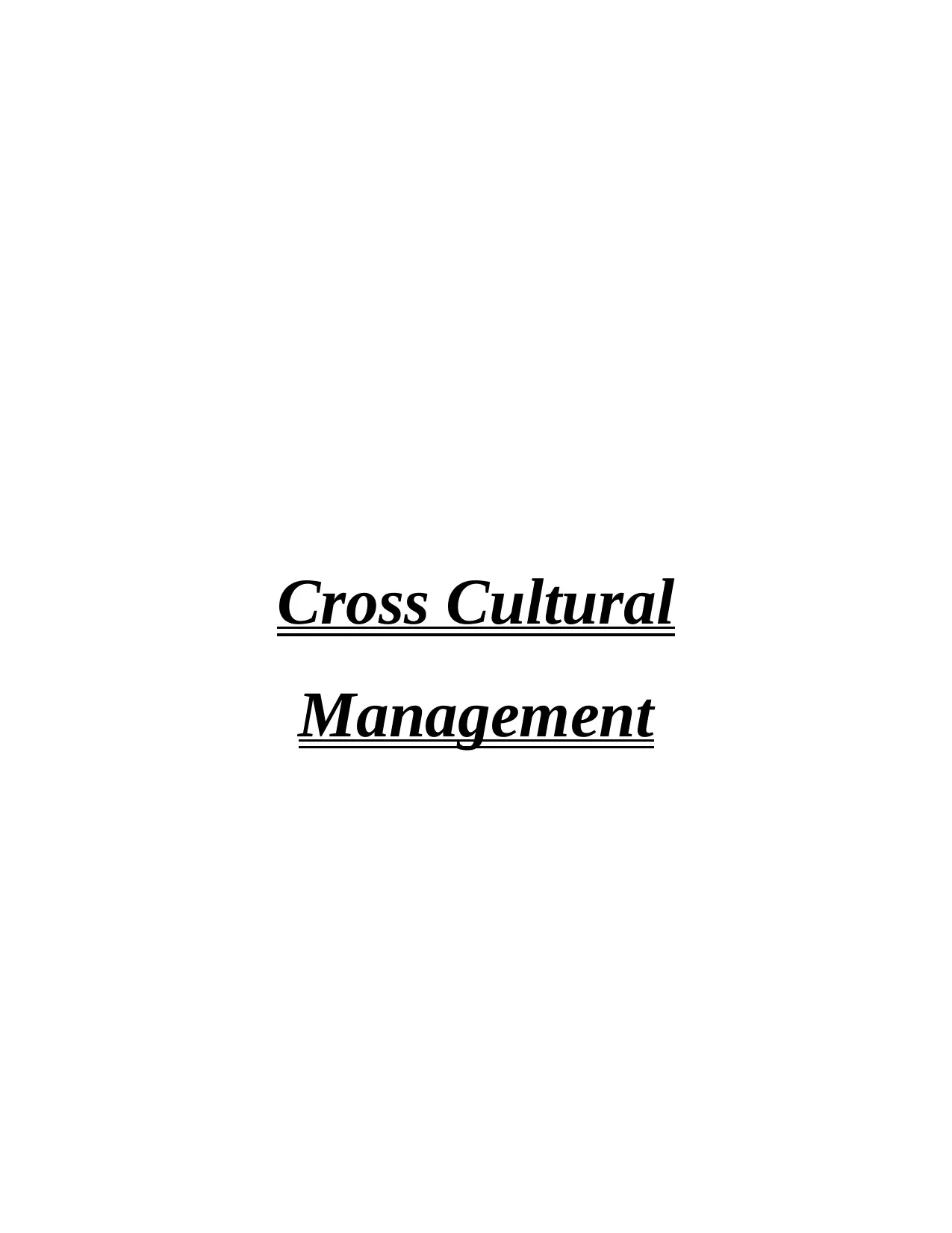
Cross Cultural
Management
Management
Paraphrase This Document
Need a fresh take? Get an instant paraphrase of this document with our AI Paraphraser
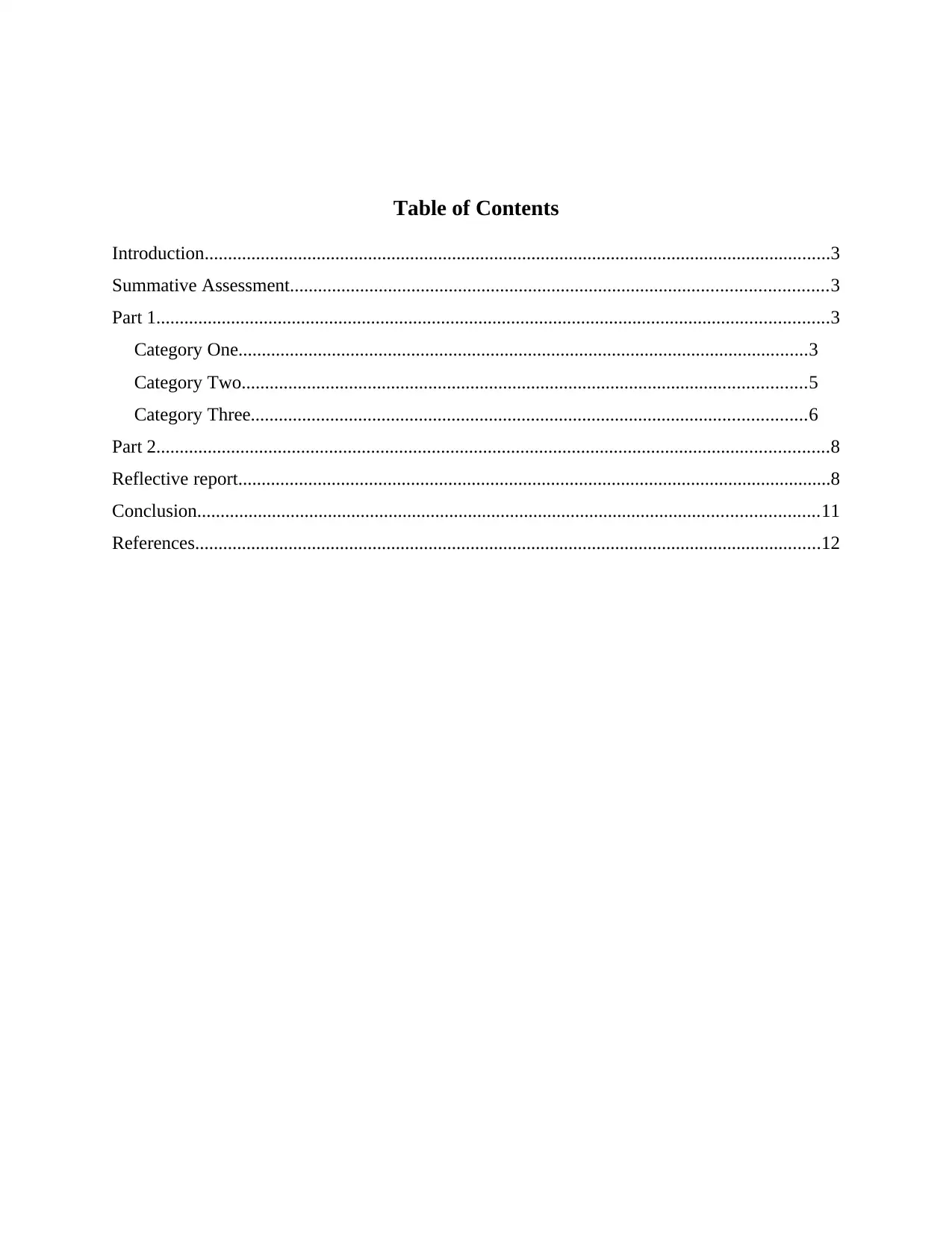
Table of Contents
Introduction......................................................................................................................................3
Summative Assessment...................................................................................................................3
Part 1................................................................................................................................................3
Category One..........................................................................................................................3
Category Two.........................................................................................................................5
Category Three.......................................................................................................................6
Part 2................................................................................................................................................8
Reflective report...............................................................................................................................8
Conclusion.....................................................................................................................................11
References......................................................................................................................................12
Introduction......................................................................................................................................3
Summative Assessment...................................................................................................................3
Part 1................................................................................................................................................3
Category One..........................................................................................................................3
Category Two.........................................................................................................................5
Category Three.......................................................................................................................6
Part 2................................................................................................................................................8
Reflective report...............................................................................................................................8
Conclusion.....................................................................................................................................11
References......................................................................................................................................12
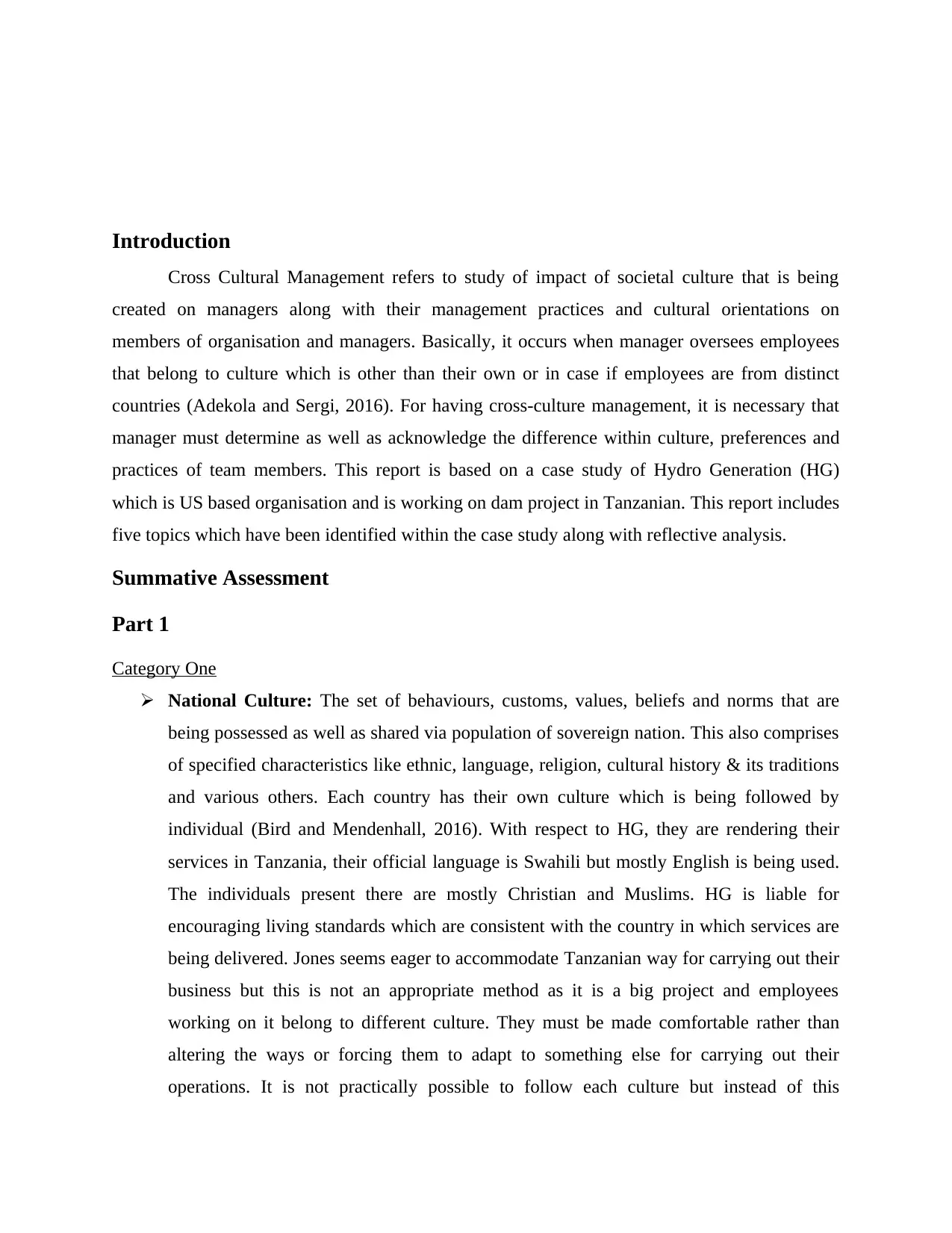
Introduction
Cross Cultural Management refers to study of impact of societal culture that is being
created on managers along with their management practices and cultural orientations on
members of organisation and managers. Basically, it occurs when manager oversees employees
that belong to culture which is other than their own or in case if employees are from distinct
countries (Adekola and Sergi, 2016). For having cross-culture management, it is necessary that
manager must determine as well as acknowledge the difference within culture, preferences and
practices of team members. This report is based on a case study of Hydro Generation (HG)
which is US based organisation and is working on dam project in Tanzanian. This report includes
five topics which have been identified within the case study along with reflective analysis.
Summative Assessment
Part 1
Category One
National Culture: The set of behaviours, customs, values, beliefs and norms that are
being possessed as well as shared via population of sovereign nation. This also comprises
of specified characteristics like ethnic, language, religion, cultural history & its traditions
and various others. Each country has their own culture which is being followed by
individual (Bird and Mendenhall, 2016). With respect to HG, they are rendering their
services in Tanzania, their official language is Swahili but mostly English is being used.
The individuals present there are mostly Christian and Muslims. HG is liable for
encouraging living standards which are consistent with the country in which services are
being delivered. Jones seems eager to accommodate Tanzanian way for carrying out their
business but this is not an appropriate method as it is a big project and employees
working on it belong to different culture. They must be made comfortable rather than
altering the ways or forcing them to adapt to something else for carrying out their
operations. It is not practically possible to follow each culture but instead of this
Cross Cultural Management refers to study of impact of societal culture that is being
created on managers along with their management practices and cultural orientations on
members of organisation and managers. Basically, it occurs when manager oversees employees
that belong to culture which is other than their own or in case if employees are from distinct
countries (Adekola and Sergi, 2016). For having cross-culture management, it is necessary that
manager must determine as well as acknowledge the difference within culture, preferences and
practices of team members. This report is based on a case study of Hydro Generation (HG)
which is US based organisation and is working on dam project in Tanzanian. This report includes
five topics which have been identified within the case study along with reflective analysis.
Summative Assessment
Part 1
Category One
National Culture: The set of behaviours, customs, values, beliefs and norms that are
being possessed as well as shared via population of sovereign nation. This also comprises
of specified characteristics like ethnic, language, religion, cultural history & its traditions
and various others. Each country has their own culture which is being followed by
individual (Bird and Mendenhall, 2016). With respect to HG, they are rendering their
services in Tanzania, their official language is Swahili but mostly English is being used.
The individuals present there are mostly Christian and Muslims. HG is liable for
encouraging living standards which are consistent with the country in which services are
being delivered. Jones seems eager to accommodate Tanzanian way for carrying out their
business but this is not an appropriate method as it is a big project and employees
working on it belong to different culture. They must be made comfortable rather than
altering the ways or forcing them to adapt to something else for carrying out their
operations. It is not practically possible to follow each culture but instead of this
⊘ This is a preview!⊘
Do you want full access?
Subscribe today to unlock all pages.

Trusted by 1+ million students worldwide
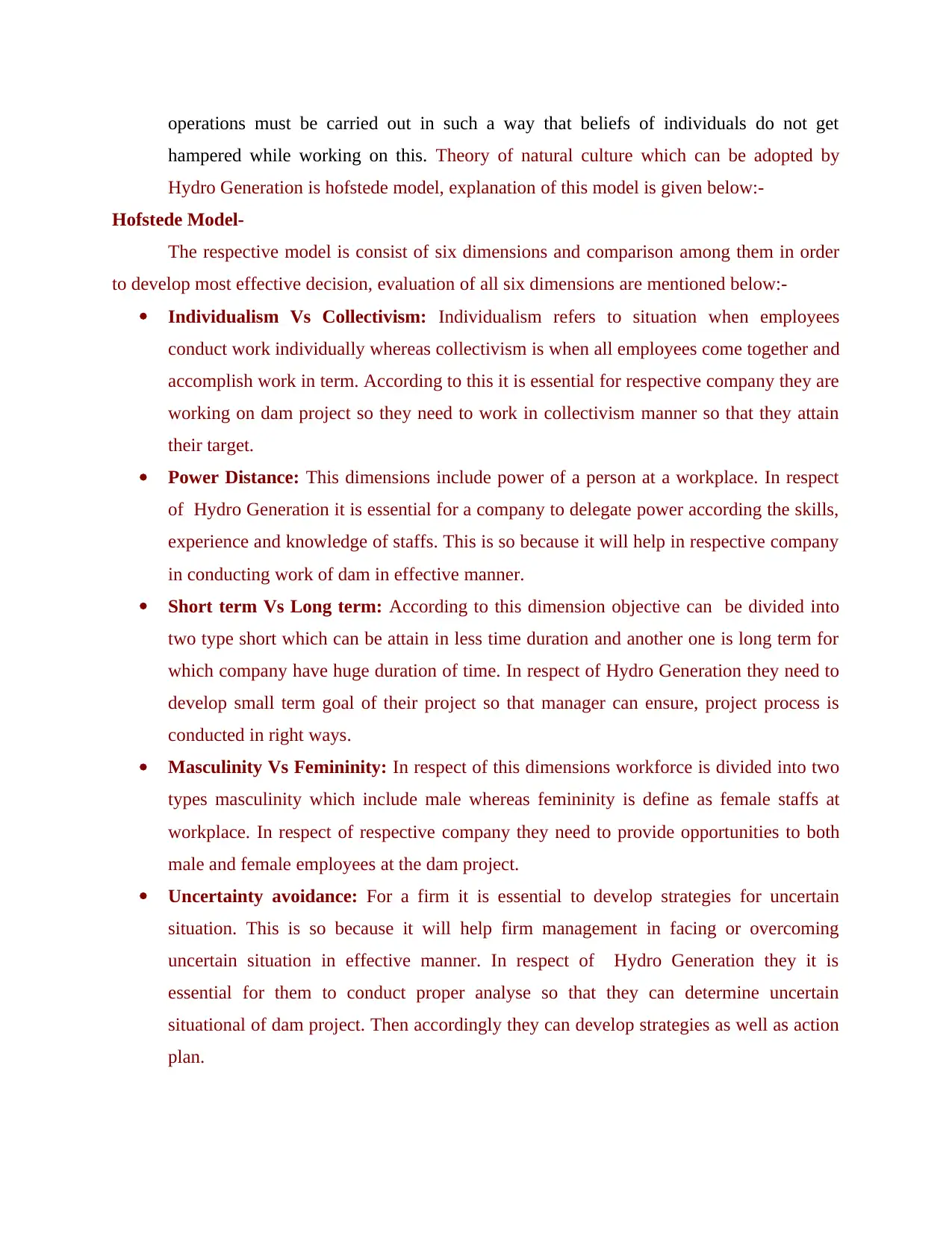
operations must be carried out in such a way that beliefs of individuals do not get
hampered while working on this. Theory of natural culture which can be adopted by
Hydro Generation is hofstede model, explanation of this model is given below:-
Hofstede Model-
The respective model is consist of six dimensions and comparison among them in order
to develop most effective decision, evaluation of all six dimensions are mentioned below:-
Individualism Vs Collectivism: Individualism refers to situation when employees
conduct work individually whereas collectivism is when all employees come together and
accomplish work in term. According to this it is essential for respective company they are
working on dam project so they need to work in collectivism manner so that they attain
their target.
Power Distance: This dimensions include power of a person at a workplace. In respect
of Hydro Generation it is essential for a company to delegate power according the skills,
experience and knowledge of staffs. This is so because it will help in respective company
in conducting work of dam in effective manner.
Short term Vs Long term: According to this dimension objective can be divided into
two type short which can be attain in less time duration and another one is long term for
which company have huge duration of time. In respect of Hydro Generation they need to
develop small term goal of their project so that manager can ensure, project process is
conducted in right ways.
Masculinity Vs Femininity: In respect of this dimensions workforce is divided into two
types masculinity which include male whereas femininity is define as female staffs at
workplace. In respect of respective company they need to provide opportunities to both
male and female employees at the dam project.
Uncertainty avoidance: For a firm it is essential to develop strategies for uncertain
situation. This is so because it will help firm management in facing or overcoming
uncertain situation in effective manner. In respect of Hydro Generation they it is
essential for them to conduct proper analyse so that they can determine uncertain
situational of dam project. Then accordingly they can develop strategies as well as action
plan.
hampered while working on this. Theory of natural culture which can be adopted by
Hydro Generation is hofstede model, explanation of this model is given below:-
Hofstede Model-
The respective model is consist of six dimensions and comparison among them in order
to develop most effective decision, evaluation of all six dimensions are mentioned below:-
Individualism Vs Collectivism: Individualism refers to situation when employees
conduct work individually whereas collectivism is when all employees come together and
accomplish work in term. According to this it is essential for respective company they are
working on dam project so they need to work in collectivism manner so that they attain
their target.
Power Distance: This dimensions include power of a person at a workplace. In respect
of Hydro Generation it is essential for a company to delegate power according the skills,
experience and knowledge of staffs. This is so because it will help in respective company
in conducting work of dam in effective manner.
Short term Vs Long term: According to this dimension objective can be divided into
two type short which can be attain in less time duration and another one is long term for
which company have huge duration of time. In respect of Hydro Generation they need to
develop small term goal of their project so that manager can ensure, project process is
conducted in right ways.
Masculinity Vs Femininity: In respect of this dimensions workforce is divided into two
types masculinity which include male whereas femininity is define as female staffs at
workplace. In respect of respective company they need to provide opportunities to both
male and female employees at the dam project.
Uncertainty avoidance: For a firm it is essential to develop strategies for uncertain
situation. This is so because it will help firm management in facing or overcoming
uncertain situation in effective manner. In respect of Hydro Generation they it is
essential for them to conduct proper analyse so that they can determine uncertain
situational of dam project. Then accordingly they can develop strategies as well as action
plan.
Paraphrase This Document
Need a fresh take? Get an instant paraphrase of this document with our AI Paraphraser
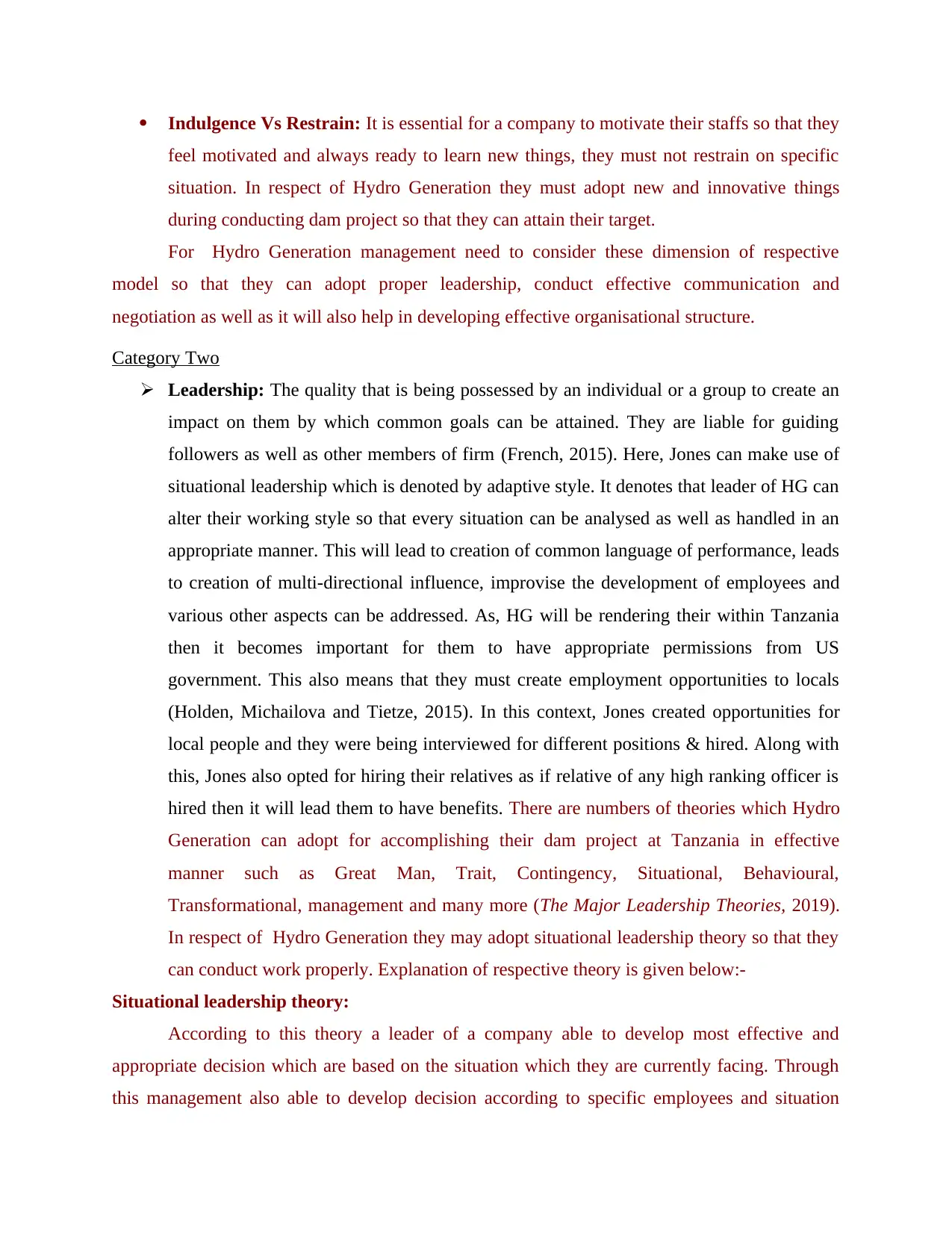
Indulgence Vs Restrain: It is essential for a company to motivate their staffs so that they
feel motivated and always ready to learn new things, they must not restrain on specific
situation. In respect of Hydro Generation they must adopt new and innovative things
during conducting dam project so that they can attain their target.
For Hydro Generation management need to consider these dimension of respective
model so that they can adopt proper leadership, conduct effective communication and
negotiation as well as it will also help in developing effective organisational structure.
Category Two
Leadership: The quality that is being possessed by an individual or a group to create an
impact on them by which common goals can be attained. They are liable for guiding
followers as well as other members of firm (French, 2015). Here, Jones can make use of
situational leadership which is denoted by adaptive style. It denotes that leader of HG can
alter their working style so that every situation can be analysed as well as handled in an
appropriate manner. This will lead to creation of common language of performance, leads
to creation of multi-directional influence, improvise the development of employees and
various other aspects can be addressed. As, HG will be rendering their within Tanzania
then it becomes important for them to have appropriate permissions from US
government. This also means that they must create employment opportunities to locals
(Holden, Michailova and Tietze, 2015). In this context, Jones created opportunities for
local people and they were being interviewed for different positions & hired. Along with
this, Jones also opted for hiring their relatives as if relative of any high ranking officer is
hired then it will lead them to have benefits. There are numbers of theories which Hydro
Generation can adopt for accomplishing their dam project at Tanzania in effective
manner such as Great Man, Trait, Contingency, Situational, Behavioural,
Transformational, management and many more (The Major Leadership Theories, 2019).
In respect of Hydro Generation they may adopt situational leadership theory so that they
can conduct work properly. Explanation of respective theory is given below:-
Situational leadership theory:
According to this theory a leader of a company able to develop most effective and
appropriate decision which are based on the situation which they are currently facing. Through
this management also able to develop decision according to specific employees and situation
feel motivated and always ready to learn new things, they must not restrain on specific
situation. In respect of Hydro Generation they must adopt new and innovative things
during conducting dam project so that they can attain their target.
For Hydro Generation management need to consider these dimension of respective
model so that they can adopt proper leadership, conduct effective communication and
negotiation as well as it will also help in developing effective organisational structure.
Category Two
Leadership: The quality that is being possessed by an individual or a group to create an
impact on them by which common goals can be attained. They are liable for guiding
followers as well as other members of firm (French, 2015). Here, Jones can make use of
situational leadership which is denoted by adaptive style. It denotes that leader of HG can
alter their working style so that every situation can be analysed as well as handled in an
appropriate manner. This will lead to creation of common language of performance, leads
to creation of multi-directional influence, improvise the development of employees and
various other aspects can be addressed. As, HG will be rendering their within Tanzania
then it becomes important for them to have appropriate permissions from US
government. This also means that they must create employment opportunities to locals
(Holden, Michailova and Tietze, 2015). In this context, Jones created opportunities for
local people and they were being interviewed for different positions & hired. Along with
this, Jones also opted for hiring their relatives as if relative of any high ranking officer is
hired then it will lead them to have benefits. There are numbers of theories which Hydro
Generation can adopt for accomplishing their dam project at Tanzania in effective
manner such as Great Man, Trait, Contingency, Situational, Behavioural,
Transformational, management and many more (The Major Leadership Theories, 2019).
In respect of Hydro Generation they may adopt situational leadership theory so that they
can conduct work properly. Explanation of respective theory is given below:-
Situational leadership theory:
According to this theory a leader of a company able to develop most effective and
appropriate decision which are based on the situation which they are currently facing. Through
this management also able to develop decision according to specific employees and situation
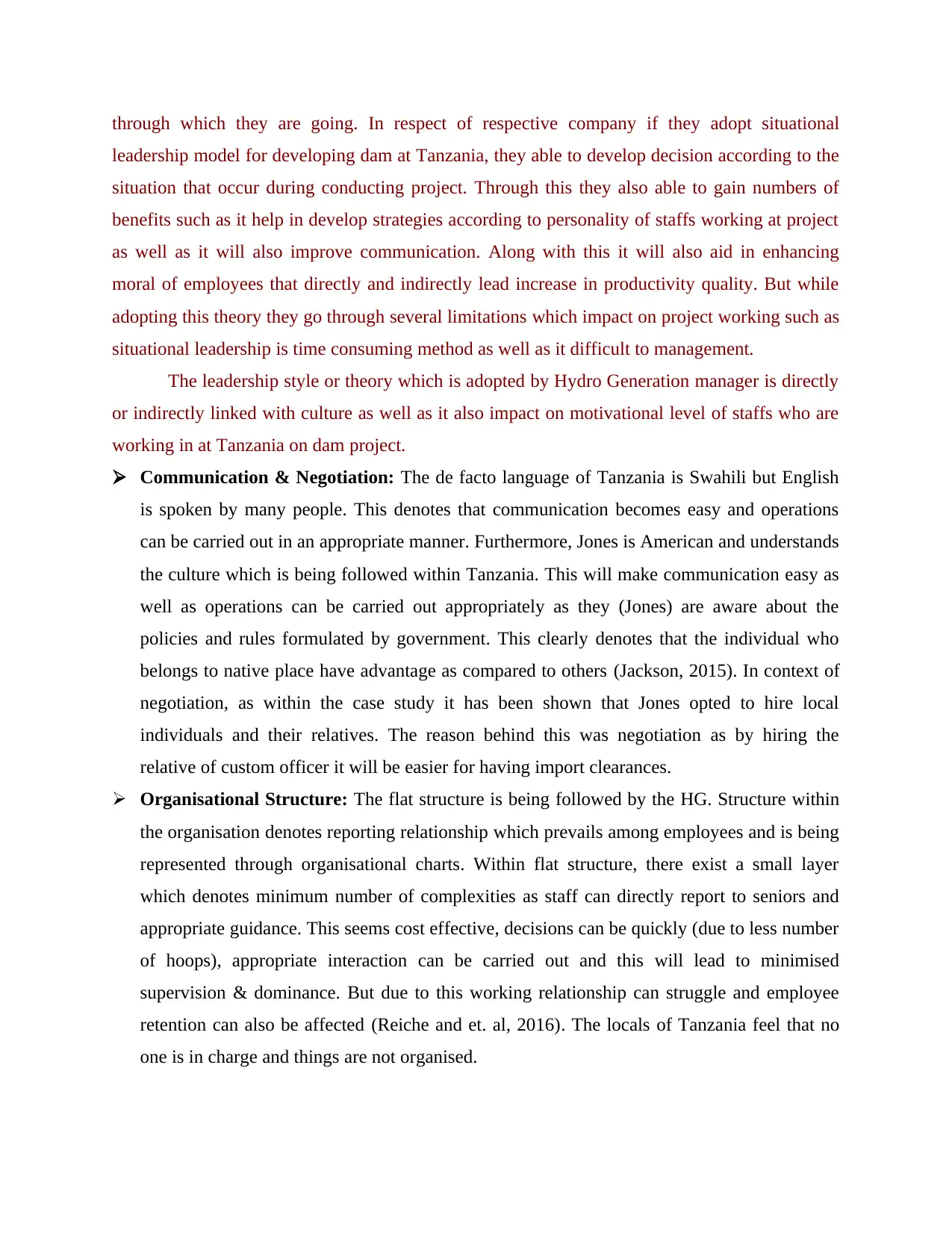
through which they are going. In respect of respective company if they adopt situational
leadership model for developing dam at Tanzania, they able to develop decision according to the
situation that occur during conducting project. Through this they also able to gain numbers of
benefits such as it help in develop strategies according to personality of staffs working at project
as well as it will also improve communication. Along with this it will also aid in enhancing
moral of employees that directly and indirectly lead increase in productivity quality. But while
adopting this theory they go through several limitations which impact on project working such as
situational leadership is time consuming method as well as it difficult to management.
The leadership style or theory which is adopted by Hydro Generation manager is directly
or indirectly linked with culture as well as it also impact on motivational level of staffs who are
working in at Tanzania on dam project.
Communication & Negotiation: The de facto language of Tanzania is Swahili but English
is spoken by many people. This denotes that communication becomes easy and operations
can be carried out in an appropriate manner. Furthermore, Jones is American and understands
the culture which is being followed within Tanzania. This will make communication easy as
well as operations can be carried out appropriately as they (Jones) are aware about the
policies and rules formulated by government. This clearly denotes that the individual who
belongs to native place have advantage as compared to others (Jackson, 2015). In context of
negotiation, as within the case study it has been shown that Jones opted to hire local
individuals and their relatives. The reason behind this was negotiation as by hiring the
relative of custom officer it will be easier for having import clearances.
Organisational Structure: The flat structure is being followed by the HG. Structure within
the organisation denotes reporting relationship which prevails among employees and is being
represented through organisational charts. Within flat structure, there exist a small layer
which denotes minimum number of complexities as staff can directly report to seniors and
appropriate guidance. This seems cost effective, decisions can be quickly (due to less number
of hoops), appropriate interaction can be carried out and this will lead to minimised
supervision & dominance. But due to this working relationship can struggle and employee
retention can also be affected (Reiche and et. al, 2016). The locals of Tanzania feel that no
one is in charge and things are not organised.
leadership model for developing dam at Tanzania, they able to develop decision according to the
situation that occur during conducting project. Through this they also able to gain numbers of
benefits such as it help in develop strategies according to personality of staffs working at project
as well as it will also improve communication. Along with this it will also aid in enhancing
moral of employees that directly and indirectly lead increase in productivity quality. But while
adopting this theory they go through several limitations which impact on project working such as
situational leadership is time consuming method as well as it difficult to management.
The leadership style or theory which is adopted by Hydro Generation manager is directly
or indirectly linked with culture as well as it also impact on motivational level of staffs who are
working in at Tanzania on dam project.
Communication & Negotiation: The de facto language of Tanzania is Swahili but English
is spoken by many people. This denotes that communication becomes easy and operations
can be carried out in an appropriate manner. Furthermore, Jones is American and understands
the culture which is being followed within Tanzania. This will make communication easy as
well as operations can be carried out appropriately as they (Jones) are aware about the
policies and rules formulated by government. This clearly denotes that the individual who
belongs to native place have advantage as compared to others (Jackson, 2015). In context of
negotiation, as within the case study it has been shown that Jones opted to hire local
individuals and their relatives. The reason behind this was negotiation as by hiring the
relative of custom officer it will be easier for having import clearances.
Organisational Structure: The flat structure is being followed by the HG. Structure within
the organisation denotes reporting relationship which prevails among employees and is being
represented through organisational charts. Within flat structure, there exist a small layer
which denotes minimum number of complexities as staff can directly report to seniors and
appropriate guidance. This seems cost effective, decisions can be quickly (due to less number
of hoops), appropriate interaction can be carried out and this will lead to minimised
supervision & dominance. But due to this working relationship can struggle and employee
retention can also be affected (Reiche and et. al, 2016). The locals of Tanzania feel that no
one is in charge and things are not organised.
⊘ This is a preview!⊘
Do you want full access?
Subscribe today to unlock all pages.

Trusted by 1+ million students worldwide
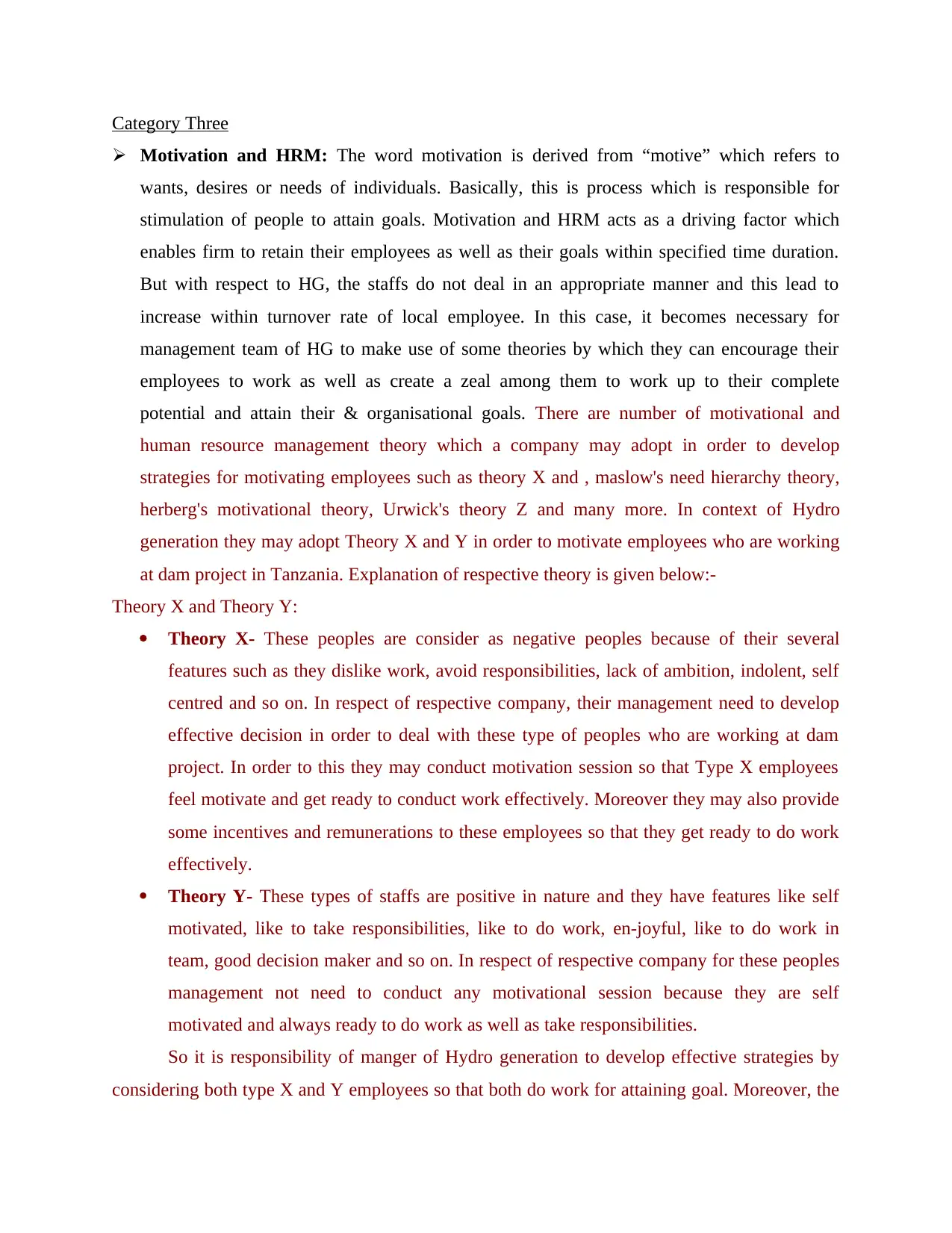
Category Three
Motivation and HRM: The word motivation is derived from “motive” which refers to
wants, desires or needs of individuals. Basically, this is process which is responsible for
stimulation of people to attain goals. Motivation and HRM acts as a driving factor which
enables firm to retain their employees as well as their goals within specified time duration.
But with respect to HG, the staffs do not deal in an appropriate manner and this lead to
increase within turnover rate of local employee. In this case, it becomes necessary for
management team of HG to make use of some theories by which they can encourage their
employees to work as well as create a zeal among them to work up to their complete
potential and attain their & organisational goals. There are number of motivational and
human resource management theory which a company may adopt in order to develop
strategies for motivating employees such as theory X and , maslow's need hierarchy theory,
herberg's motivational theory, Urwick's theory Z and many more. In context of Hydro
generation they may adopt Theory X and Y in order to motivate employees who are working
at dam project in Tanzania. Explanation of respective theory is given below:-
Theory X and Theory Y:
Theory X- These peoples are consider as negative peoples because of their several
features such as they dislike work, avoid responsibilities, lack of ambition, indolent, self
centred and so on. In respect of respective company, their management need to develop
effective decision in order to deal with these type of peoples who are working at dam
project. In order to this they may conduct motivation session so that Type X employees
feel motivate and get ready to conduct work effectively. Moreover they may also provide
some incentives and remunerations to these employees so that they get ready to do work
effectively.
Theory Y- These types of staffs are positive in nature and they have features like self
motivated, like to take responsibilities, like to do work, en-joyful, like to do work in
team, good decision maker and so on. In respect of respective company for these peoples
management not need to conduct any motivational session because they are self
motivated and always ready to do work as well as take responsibilities.
So it is responsibility of manger of Hydro generation to develop effective strategies by
considering both type X and Y employees so that both do work for attaining goal. Moreover, the
Motivation and HRM: The word motivation is derived from “motive” which refers to
wants, desires or needs of individuals. Basically, this is process which is responsible for
stimulation of people to attain goals. Motivation and HRM acts as a driving factor which
enables firm to retain their employees as well as their goals within specified time duration.
But with respect to HG, the staffs do not deal in an appropriate manner and this lead to
increase within turnover rate of local employee. In this case, it becomes necessary for
management team of HG to make use of some theories by which they can encourage their
employees to work as well as create a zeal among them to work up to their complete
potential and attain their & organisational goals. There are number of motivational and
human resource management theory which a company may adopt in order to develop
strategies for motivating employees such as theory X and , maslow's need hierarchy theory,
herberg's motivational theory, Urwick's theory Z and many more. In context of Hydro
generation they may adopt Theory X and Y in order to motivate employees who are working
at dam project in Tanzania. Explanation of respective theory is given below:-
Theory X and Theory Y:
Theory X- These peoples are consider as negative peoples because of their several
features such as they dislike work, avoid responsibilities, lack of ambition, indolent, self
centred and so on. In respect of respective company, their management need to develop
effective decision in order to deal with these type of peoples who are working at dam
project. In order to this they may conduct motivation session so that Type X employees
feel motivate and get ready to conduct work effectively. Moreover they may also provide
some incentives and remunerations to these employees so that they get ready to do work
effectively.
Theory Y- These types of staffs are positive in nature and they have features like self
motivated, like to take responsibilities, like to do work, en-joyful, like to do work in
team, good decision maker and so on. In respect of respective company for these peoples
management not need to conduct any motivational session because they are self
motivated and always ready to do work as well as take responsibilities.
So it is responsibility of manger of Hydro generation to develop effective strategies by
considering both type X and Y employees so that both do work for attaining goal. Moreover, the
Paraphrase This Document
Need a fresh take? Get an instant paraphrase of this document with our AI Paraphraser
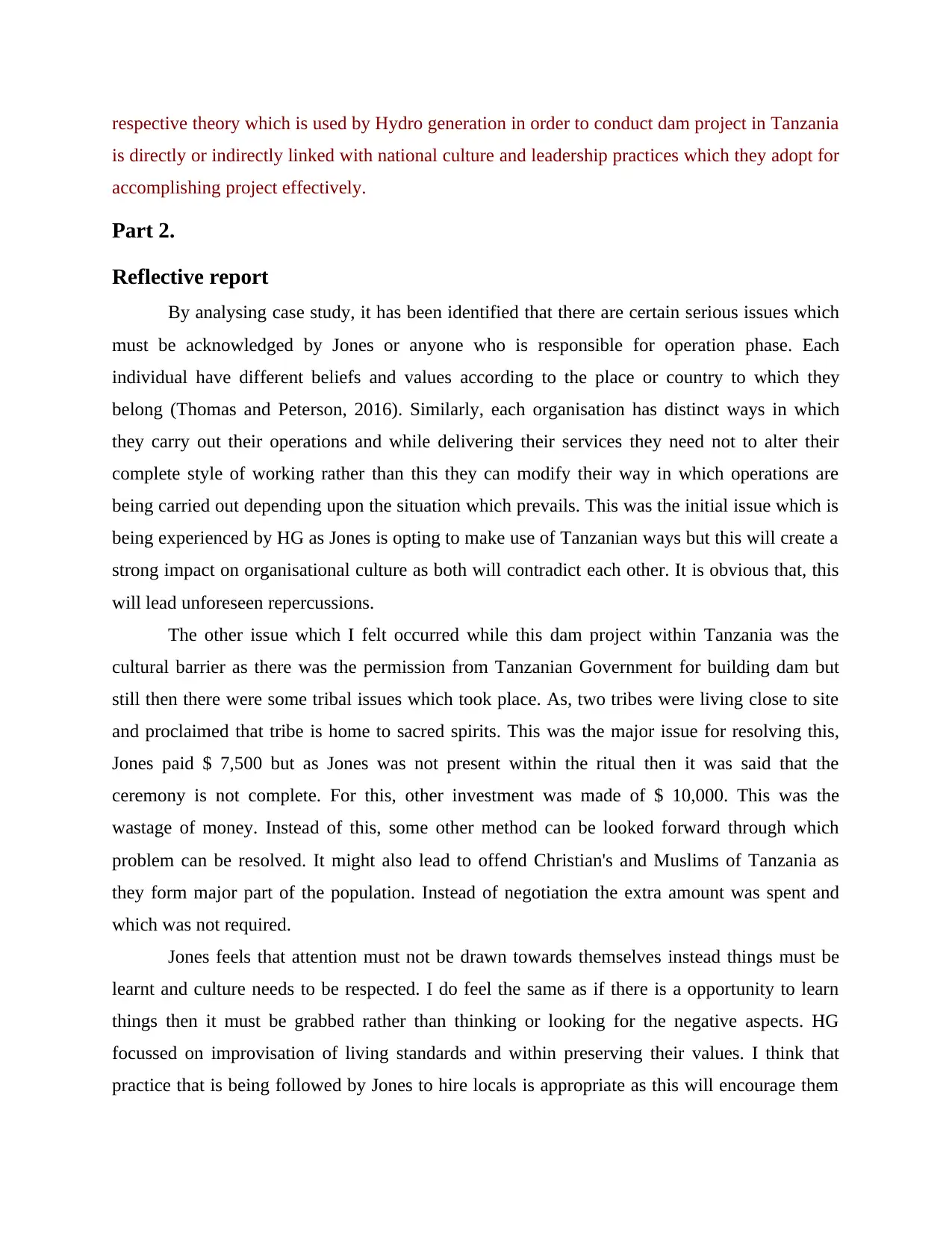
respective theory which is used by Hydro generation in order to conduct dam project in Tanzania
is directly or indirectly linked with national culture and leadership practices which they adopt for
accomplishing project effectively.
Part 2.
Reflective report
By analysing case study, it has been identified that there are certain serious issues which
must be acknowledged by Jones or anyone who is responsible for operation phase. Each
individual have different beliefs and values according to the place or country to which they
belong (Thomas and Peterson, 2016). Similarly, each organisation has distinct ways in which
they carry out their operations and while delivering their services they need not to alter their
complete style of working rather than this they can modify their way in which operations are
being carried out depending upon the situation which prevails. This was the initial issue which is
being experienced by HG as Jones is opting to make use of Tanzanian ways but this will create a
strong impact on organisational culture as both will contradict each other. It is obvious that, this
will lead unforeseen repercussions.
The other issue which I felt occurred while this dam project within Tanzania was the
cultural barrier as there was the permission from Tanzanian Government for building dam but
still then there were some tribal issues which took place. As, two tribes were living close to site
and proclaimed that tribe is home to sacred spirits. This was the major issue for resolving this,
Jones paid $ 7,500 but as Jones was not present within the ritual then it was said that the
ceremony is not complete. For this, other investment was made of $ 10,000. This was the
wastage of money. Instead of this, some other method can be looked forward through which
problem can be resolved. It might also lead to offend Christian's and Muslims of Tanzania as
they form major part of the population. Instead of negotiation the extra amount was spent and
which was not required.
Jones feels that attention must not be drawn towards themselves instead things must be
learnt and culture needs to be respected. I do feel the same as if there is a opportunity to learn
things then it must be grabbed rather than thinking or looking for the negative aspects. HG
focussed on improvisation of living standards and within preserving their values. I think that
practice that is being followed by Jones to hire locals is appropriate as this will encourage them
is directly or indirectly linked with national culture and leadership practices which they adopt for
accomplishing project effectively.
Part 2.
Reflective report
By analysing case study, it has been identified that there are certain serious issues which
must be acknowledged by Jones or anyone who is responsible for operation phase. Each
individual have different beliefs and values according to the place or country to which they
belong (Thomas and Peterson, 2016). Similarly, each organisation has distinct ways in which
they carry out their operations and while delivering their services they need not to alter their
complete style of working rather than this they can modify their way in which operations are
being carried out depending upon the situation which prevails. This was the initial issue which is
being experienced by HG as Jones is opting to make use of Tanzanian ways but this will create a
strong impact on organisational culture as both will contradict each other. It is obvious that, this
will lead unforeseen repercussions.
The other issue which I felt occurred while this dam project within Tanzania was the
cultural barrier as there was the permission from Tanzanian Government for building dam but
still then there were some tribal issues which took place. As, two tribes were living close to site
and proclaimed that tribe is home to sacred spirits. This was the major issue for resolving this,
Jones paid $ 7,500 but as Jones was not present within the ritual then it was said that the
ceremony is not complete. For this, other investment was made of $ 10,000. This was the
wastage of money. Instead of this, some other method can be looked forward through which
problem can be resolved. It might also lead to offend Christian's and Muslims of Tanzania as
they form major part of the population. Instead of negotiation the extra amount was spent and
which was not required.
Jones feels that attention must not be drawn towards themselves instead things must be
learnt and culture needs to be respected. I do feel the same as if there is a opportunity to learn
things then it must be grabbed rather than thinking or looking for the negative aspects. HG
focussed on improvisation of living standards and within preserving their values. I think that
practice that is being followed by Jones to hire locals is appropriate as this will encourage them
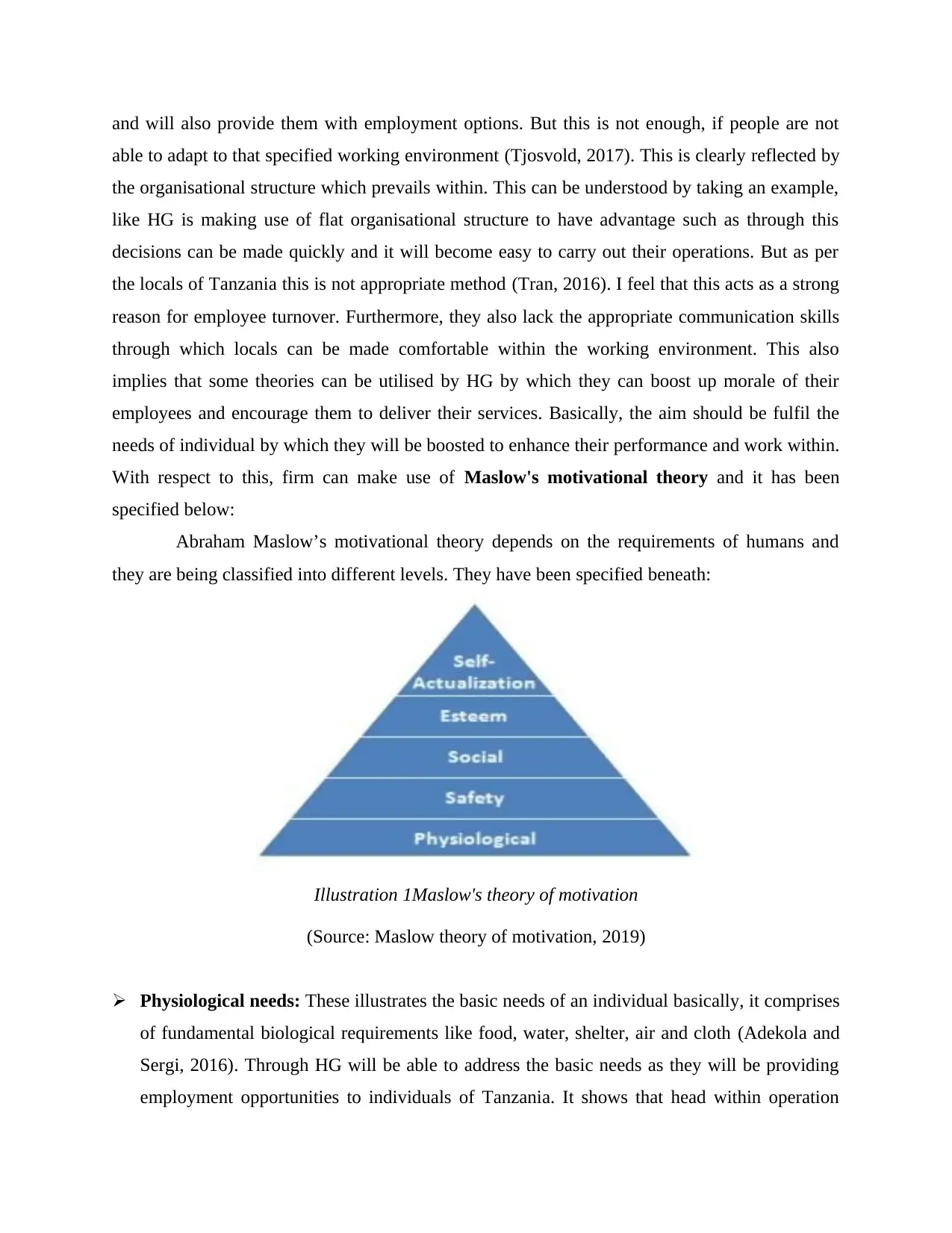
and will also provide them with employment options. But this is not enough, if people are not
able to adapt to that specified working environment (Tjosvold, 2017). This is clearly reflected by
the organisational structure which prevails within. This can be understood by taking an example,
like HG is making use of flat organisational structure to have advantage such as through this
decisions can be made quickly and it will become easy to carry out their operations. But as per
the locals of Tanzania this is not appropriate method (Tran, 2016). I feel that this acts as a strong
reason for employee turnover. Furthermore, they also lack the appropriate communication skills
through which locals can be made comfortable within the working environment. This also
implies that some theories can be utilised by HG by which they can boost up morale of their
employees and encourage them to deliver their services. Basically, the aim should be fulfil the
needs of individual by which they will be boosted to enhance their performance and work within.
With respect to this, firm can make use of Maslow's motivational theory and it has been
specified below:
Abraham Maslow’s motivational theory depends on the requirements of humans and
they are being classified into different levels. They have been specified beneath:
Illustration 1Maslow's theory of motivation
(Source: Maslow theory of motivation, 2019)
Physiological needs: These illustrates the basic needs of an individual basically, it comprises
of fundamental biological requirements like food, water, shelter, air and cloth (Adekola and
Sergi, 2016). Through HG will be able to address the basic needs as they will be providing
employment opportunities to individuals of Tanzania. It shows that head within operation
able to adapt to that specified working environment (Tjosvold, 2017). This is clearly reflected by
the organisational structure which prevails within. This can be understood by taking an example,
like HG is making use of flat organisational structure to have advantage such as through this
decisions can be made quickly and it will become easy to carry out their operations. But as per
the locals of Tanzania this is not appropriate method (Tran, 2016). I feel that this acts as a strong
reason for employee turnover. Furthermore, they also lack the appropriate communication skills
through which locals can be made comfortable within the working environment. This also
implies that some theories can be utilised by HG by which they can boost up morale of their
employees and encourage them to deliver their services. Basically, the aim should be fulfil the
needs of individual by which they will be boosted to enhance their performance and work within.
With respect to this, firm can make use of Maslow's motivational theory and it has been
specified below:
Abraham Maslow’s motivational theory depends on the requirements of humans and
they are being classified into different levels. They have been specified beneath:
Illustration 1Maslow's theory of motivation
(Source: Maslow theory of motivation, 2019)
Physiological needs: These illustrates the basic needs of an individual basically, it comprises
of fundamental biological requirements like food, water, shelter, air and cloth (Adekola and
Sergi, 2016). Through HG will be able to address the basic needs as they will be providing
employment opportunities to individuals of Tanzania. It shows that head within operation
⊘ This is a preview!⊘
Do you want full access?
Subscribe today to unlock all pages.

Trusted by 1+ million students worldwide
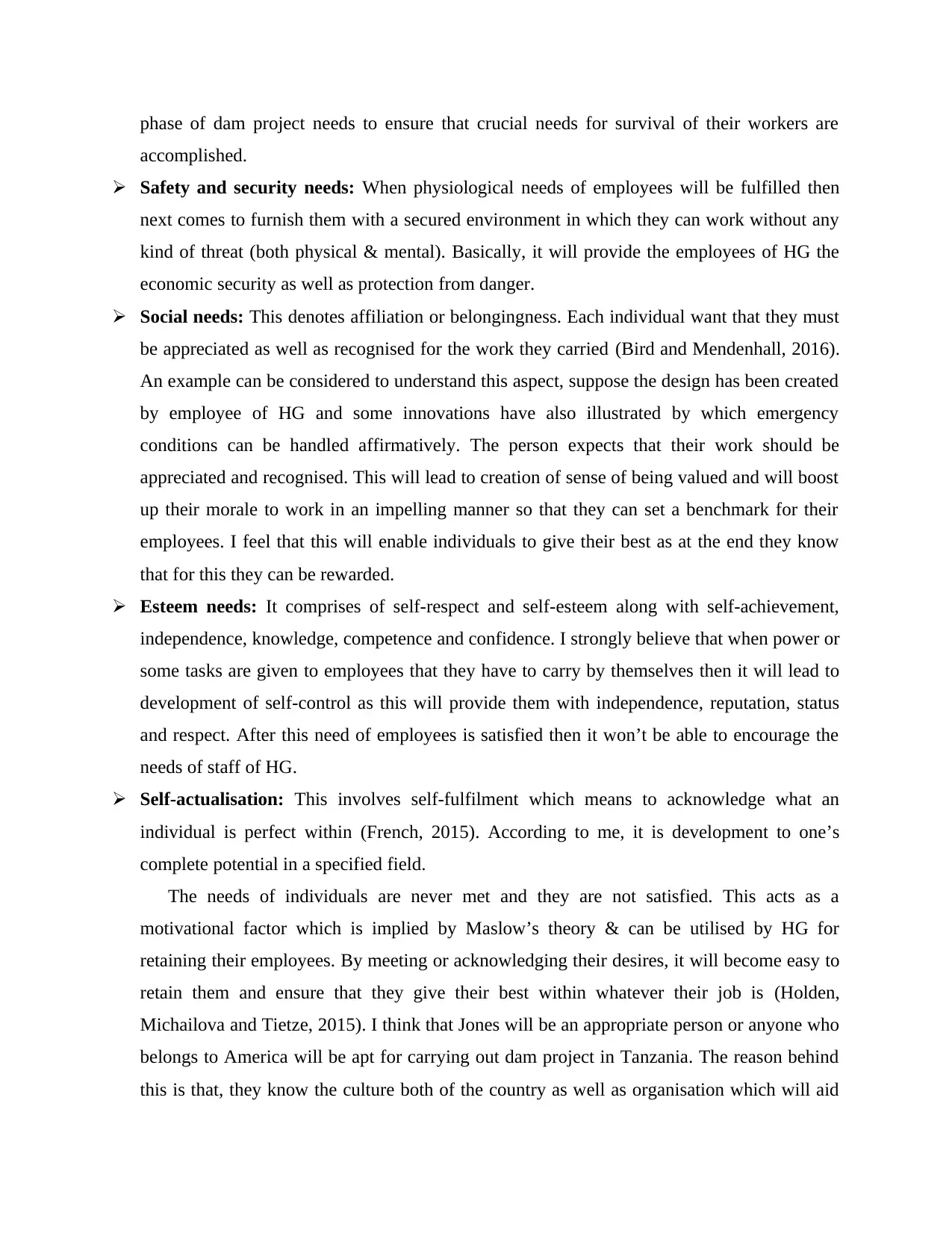
phase of dam project needs to ensure that crucial needs for survival of their workers are
accomplished.
Safety and security needs: When physiological needs of employees will be fulfilled then
next comes to furnish them with a secured environment in which they can work without any
kind of threat (both physical & mental). Basically, it will provide the employees of HG the
economic security as well as protection from danger.
Social needs: This denotes affiliation or belongingness. Each individual want that they must
be appreciated as well as recognised for the work they carried (Bird and Mendenhall, 2016).
An example can be considered to understand this aspect, suppose the design has been created
by employee of HG and some innovations have also illustrated by which emergency
conditions can be handled affirmatively. The person expects that their work should be
appreciated and recognised. This will lead to creation of sense of being valued and will boost
up their morale to work in an impelling manner so that they can set a benchmark for their
employees. I feel that this will enable individuals to give their best as at the end they know
that for this they can be rewarded.
Esteem needs: It comprises of self-respect and self-esteem along with self-achievement,
independence, knowledge, competence and confidence. I strongly believe that when power or
some tasks are given to employees that they have to carry by themselves then it will lead to
development of self-control as this will provide them with independence, reputation, status
and respect. After this need of employees is satisfied then it won’t be able to encourage the
needs of staff of HG.
Self-actualisation: This involves self-fulfilment which means to acknowledge what an
individual is perfect within (French, 2015). According to me, it is development to one’s
complete potential in a specified field.
The needs of individuals are never met and they are not satisfied. This acts as a
motivational factor which is implied by Maslow’s theory & can be utilised by HG for
retaining their employees. By meeting or acknowledging their desires, it will become easy to
retain them and ensure that they give their best within whatever their job is (Holden,
Michailova and Tietze, 2015). I think that Jones will be an appropriate person or anyone who
belongs to America will be apt for carrying out dam project in Tanzania. The reason behind
this is that, they know the culture both of the country as well as organisation which will aid
accomplished.
Safety and security needs: When physiological needs of employees will be fulfilled then
next comes to furnish them with a secured environment in which they can work without any
kind of threat (both physical & mental). Basically, it will provide the employees of HG the
economic security as well as protection from danger.
Social needs: This denotes affiliation or belongingness. Each individual want that they must
be appreciated as well as recognised for the work they carried (Bird and Mendenhall, 2016).
An example can be considered to understand this aspect, suppose the design has been created
by employee of HG and some innovations have also illustrated by which emergency
conditions can be handled affirmatively. The person expects that their work should be
appreciated and recognised. This will lead to creation of sense of being valued and will boost
up their morale to work in an impelling manner so that they can set a benchmark for their
employees. I feel that this will enable individuals to give their best as at the end they know
that for this they can be rewarded.
Esteem needs: It comprises of self-respect and self-esteem along with self-achievement,
independence, knowledge, competence and confidence. I strongly believe that when power or
some tasks are given to employees that they have to carry by themselves then it will lead to
development of self-control as this will provide them with independence, reputation, status
and respect. After this need of employees is satisfied then it won’t be able to encourage the
needs of staff of HG.
Self-actualisation: This involves self-fulfilment which means to acknowledge what an
individual is perfect within (French, 2015). According to me, it is development to one’s
complete potential in a specified field.
The needs of individuals are never met and they are not satisfied. This acts as a
motivational factor which is implied by Maslow’s theory & can be utilised by HG for
retaining their employees. By meeting or acknowledging their desires, it will become easy to
retain them and ensure that they give their best within whatever their job is (Holden,
Michailova and Tietze, 2015). I think that Jones will be an appropriate person or anyone who
belongs to America will be apt for carrying out dam project in Tanzania. The reason behind
this is that, they know the culture both of the country as well as organisation which will aid
Paraphrase This Document
Need a fresh take? Get an instant paraphrase of this document with our AI Paraphraser
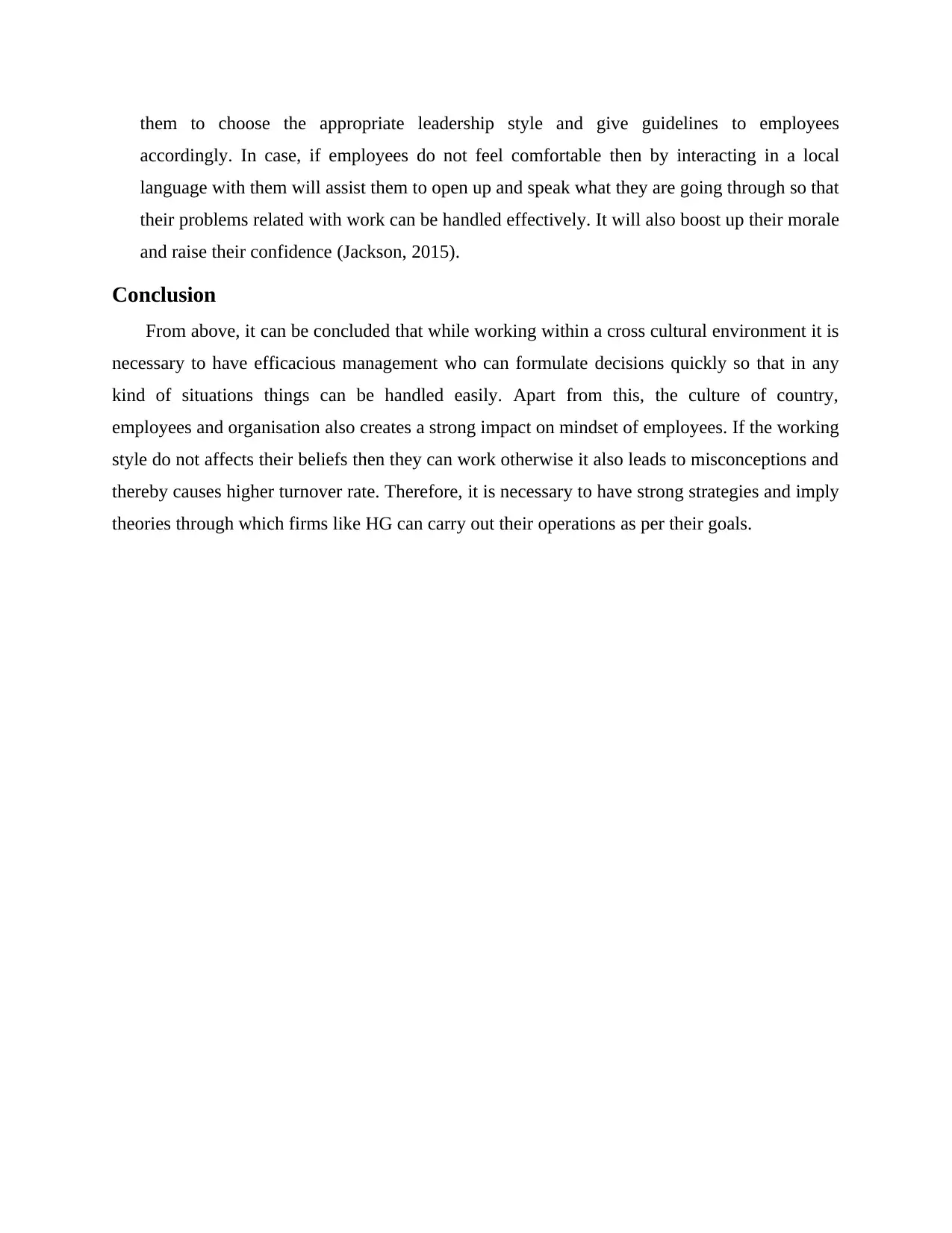
them to choose the appropriate leadership style and give guidelines to employees
accordingly. In case, if employees do not feel comfortable then by interacting in a local
language with them will assist them to open up and speak what they are going through so that
their problems related with work can be handled effectively. It will also boost up their morale
and raise their confidence (Jackson, 2015).
Conclusion
From above, it can be concluded that while working within a cross cultural environment it is
necessary to have efficacious management who can formulate decisions quickly so that in any
kind of situations things can be handled easily. Apart from this, the culture of country,
employees and organisation also creates a strong impact on mindset of employees. If the working
style do not affects their beliefs then they can work otherwise it also leads to misconceptions and
thereby causes higher turnover rate. Therefore, it is necessary to have strong strategies and imply
theories through which firms like HG can carry out their operations as per their goals.
accordingly. In case, if employees do not feel comfortable then by interacting in a local
language with them will assist them to open up and speak what they are going through so that
their problems related with work can be handled effectively. It will also boost up their morale
and raise their confidence (Jackson, 2015).
Conclusion
From above, it can be concluded that while working within a cross cultural environment it is
necessary to have efficacious management who can formulate decisions quickly so that in any
kind of situations things can be handled easily. Apart from this, the culture of country,
employees and organisation also creates a strong impact on mindset of employees. If the working
style do not affects their beliefs then they can work otherwise it also leads to misconceptions and
thereby causes higher turnover rate. Therefore, it is necessary to have strong strategies and imply
theories through which firms like HG can carry out their operations as per their goals.
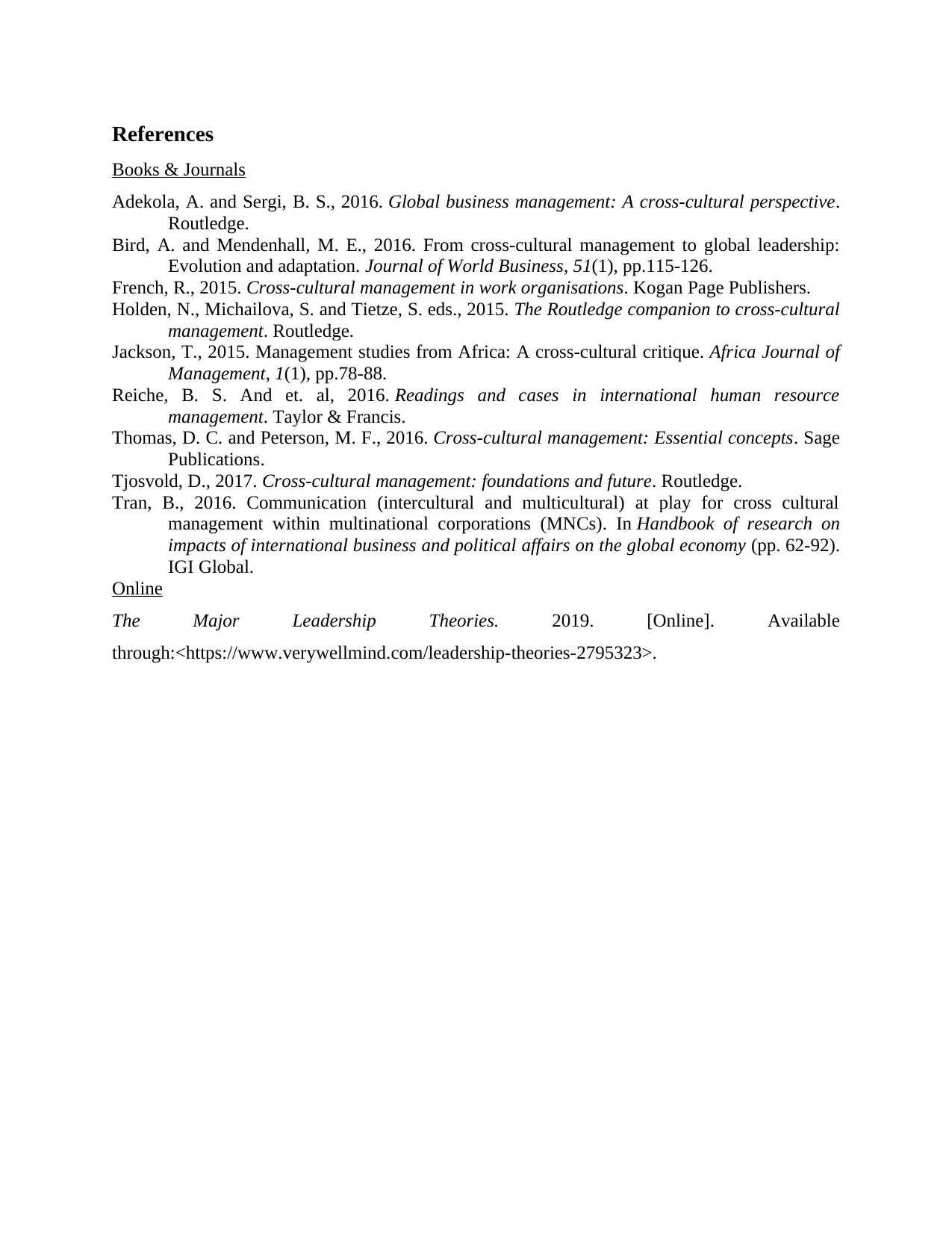
References
Books & Journals
Adekola, A. and Sergi, B. S., 2016. Global business management: A cross-cultural perspective.
Routledge.
Bird, A. and Mendenhall, M. E., 2016. From cross-cultural management to global leadership:
Evolution and adaptation. Journal of World Business, 51(1), pp.115-126.
French, R., 2015. Cross-cultural management in work organisations. Kogan Page Publishers.
Holden, N., Michailova, S. and Tietze, S. eds., 2015. The Routledge companion to cross-cultural
management. Routledge.
Jackson, T., 2015. Management studies from Africa: A cross-cultural critique. Africa Journal of
Management, 1(1), pp.78-88.
Reiche, B. S. And et. al, 2016. Readings and cases in international human resource
management. Taylor & Francis.
Thomas, D. C. and Peterson, M. F., 2016. Cross-cultural management: Essential concepts. Sage
Publications.
Tjosvold, D., 2017. Cross-cultural management: foundations and future. Routledge.
Tran, B., 2016. Communication (intercultural and multicultural) at play for cross cultural
management within multinational corporations (MNCs). In Handbook of research on
impacts of international business and political affairs on the global economy (pp. 62-92).
IGI Global.
Online
The Major Leadership Theories. 2019. [Online]. Available
through:<https://www.verywellmind.com/leadership-theories-2795323>.
Books & Journals
Adekola, A. and Sergi, B. S., 2016. Global business management: A cross-cultural perspective.
Routledge.
Bird, A. and Mendenhall, M. E., 2016. From cross-cultural management to global leadership:
Evolution and adaptation. Journal of World Business, 51(1), pp.115-126.
French, R., 2015. Cross-cultural management in work organisations. Kogan Page Publishers.
Holden, N., Michailova, S. and Tietze, S. eds., 2015. The Routledge companion to cross-cultural
management. Routledge.
Jackson, T., 2015. Management studies from Africa: A cross-cultural critique. Africa Journal of
Management, 1(1), pp.78-88.
Reiche, B. S. And et. al, 2016. Readings and cases in international human resource
management. Taylor & Francis.
Thomas, D. C. and Peterson, M. F., 2016. Cross-cultural management: Essential concepts. Sage
Publications.
Tjosvold, D., 2017. Cross-cultural management: foundations and future. Routledge.
Tran, B., 2016. Communication (intercultural and multicultural) at play for cross cultural
management within multinational corporations (MNCs). In Handbook of research on
impacts of international business and political affairs on the global economy (pp. 62-92).
IGI Global.
Online
The Major Leadership Theories. 2019. [Online]. Available
through:<https://www.verywellmind.com/leadership-theories-2795323>.
⊘ This is a preview!⊘
Do you want full access?
Subscribe today to unlock all pages.

Trusted by 1+ million students worldwide
1 out of 12
Related Documents
Your All-in-One AI-Powered Toolkit for Academic Success.
+13062052269
info@desklib.com
Available 24*7 on WhatsApp / Email
![[object Object]](/_next/static/media/star-bottom.7253800d.svg)
Unlock your academic potential
Copyright © 2020–2026 A2Z Services. All Rights Reserved. Developed and managed by ZUCOL.




